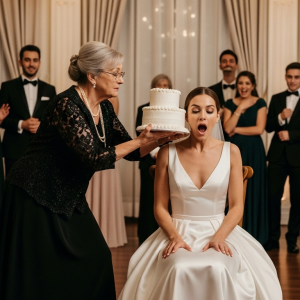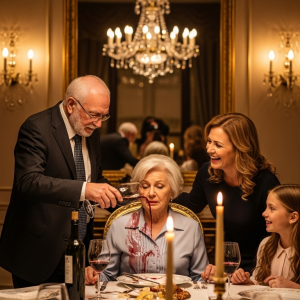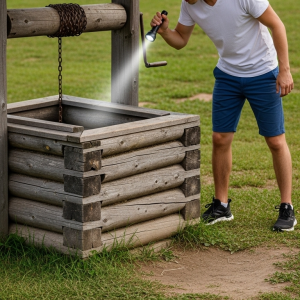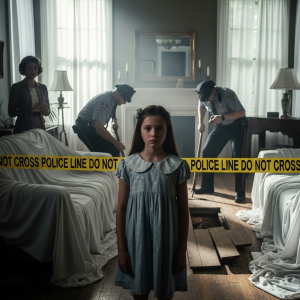Five years. In some ways, it feels like a lifetime ago; in others, it feels like it was only yesterday. I’m in my second year of college now, surrounded by textbooks and late-night study sessions, living a life that feels a world away from the one I knew then. But memory is a ghost with a long shadow, and some moments are etched so deeply into your soul that time can never fade them.
For five years, I’ve held this story close, a fragile, secret thing locked inside my heart. But silence doesn’t heal; it only preserves the pain. So tonight, I’m finally finding the strength to tell you what happened. To tell you about my sister, Lily.
It was a perfectly ordinary autumn afternoon. The sky was a brilliant, cloudless blue, and the air was crisp with the scent of fallen leaves. After school, Lily and I walked home together, our usual routine. I was fifteen, grappling with the dramatic world of high school, and she was ten, a vibrant, giggling force of nature who still saw magic in everything.
She was chattering excitedly about a project she’d done in art class, her bright green backpack bouncing with every step. Her hand, small and warm, was tucked into mine. We lived on the sixteenth floor of a tall, imposing building—a concrete giant she called our “castle in the sky.” As always, the final leg of our journey home was the elevator.
Inside the small, wood-paneled box, we were alone. Our laughter echoed off the metal walls as I told her a silly joke. She leaned her head against my arm, her bright, happy eyes looking up at me. In that moment, everything was perfect. It was safe. It was normal. It was a “before” picture, captured in time, just moments before the “after” began.
As the doors were sliding shut, a hand shot through the gap, and they jolted back open. A man stepped inside, offering a quick, apologetic smile. He was maybe in his mid-thirties, with kind eyes and a tired expression. With him was a large, beautiful dog with fur the color of pale honey.
Lily’s face lit up instantly. My sister loved animals with a pure, boundless passion. To her, a dog was not just an animal; it was a friend she hadn’t met yet. “A Labrador!” she whispered, her eyes wide with delight.
The dog was calm, its tail giving a lazy, gentle thump against the man’s leg. Lily smiled at the man, a silent question in her eyes. He nodded, “He’s friendly. His name is Leo.”
Lily started to reach her hand out, to offer the back of it for a customary sniff. But then, everything changed.
The dog, Leo, suddenly went rigid. He lifted his head, and a low, inquisitive whine rumbled deep in his chest. His friendly demeanor vanished, replaced by an intense, unnerving focus. His eyes, soft and brown just a second ago, were now locked directly onto Lily. The air in the small elevator became thick with a strange, sudden tension.
Before any of us could react, the dog lunged.
It wasn’t an aggressive attack. It was a swift, deliberate movement. He stepped closer, rose onto his hind legs, and planted his two heavy, fluffy paws squarely on Lily’s small chest. She was pinned against the wall of the elevator, her face a mask of shock and terror.
Then, he began to bark. It wasn’t a playful sound. It was a series of loud, sharp, frantic barks, filled with an alarming urgency that echoed in the confined space like a siren.
Lily let out a sharp, terrified scream, tears instantly welling in her eyes. I stood frozen for a second, my mind unable to process what was happening, before a surge of protective fury washed over me. “Get him off her!” I yelled, shoving myself between Lily and the dog.
“Leo, down! Heel!” the man commanded, yanking hard on the leash. He pulled the dog back, but Leo kept straining, his barks unabated, his eyes still fixed on my trembling little sister. “I am so, so sorry,” the man said, his face pale with shock. “Kids, don’t be afraid, he doesn’t bite. He’s never done this before.”
But I was crying now, too, my arm wrapped tightly around Lily, who was sobbing into my side. “He doesn’t bite?” I screamed, my voice shaking with rage. “He attacked my sister! Look at her, she’s terrified! I’m telling our parents! You can’t just bring dangerous animals in here!”
The man didn’t get defensive. He didn’t make more excuses. Instead, his entire expression shifted. The panic in his eyes was replaced by a look of profound seriousness, of deep, heart-wrenching sorrow. He knelt to calm his dog, stroking his head until the barking subsided into anxious whimpers. Then he looked at us, and his voice was quiet, steady, and full of a terrible weight.
“I… I have to explain,” he said, his gaze meeting mine. “Please, just listen to me for a moment. This is not just a pet. My name is David Harrison. I’m a researcher at the Northwood Oncology Institute.”
The clinical words hung in the air, completely out of place. We didn’t understand.
“Leo is a bio-detection canine,” he continued, his voice gentle but firm. “He’s specially trained. He can detect the specific volatile organic compounds that are released by certain malignant tumors.”
He let the words sink in. My anger began to recede, replaced by a cold, creeping dread.
“When he smells those compounds on a person,” Mr. Harrison explained, his eyes full of compassion, “he gives a signal. It’s his job. He jumps, he puts his paws on the source, and he barks. That’s his alert. That’s what he was just doing. I… I think you need to tell your parents. And you absolutely must take your sister to a doctor. Please. Just to be safe.”
The elevator dinged, signaling our arrival on the sixteenth floor. The doors slid open, revealing the familiar, safe hallway of our home, which now felt like a foreign country. Mr. Harrison held out a small white card. His clinic’s address and his name were printed on it. I took it with a numb, trembling hand.
“I am truly sorry,” he whispered as we stumbled out of the elevator. The doors closed, cutting off the sight of the man and his beautiful, terrifying dog.
We stood in the hallway for a long moment, the silence ringing in our ears. The business card felt cold in my hand. Then, Lily’s composure shattered, and she clung to me, her small body shaking with sobs of fear and confusion. I led her inside our apartment, my own mind a whirlwind of disbelief.
Telling our parents was one of the strangest conversations of my life. My father was furious, convinced the man was a lunatic who was trying to scare us. “A cancer-sniffing dog?” he scoffed, pacing the living room. “That’s the most ridiculous thing I’ve ever heard. I’m going to call building security, find out who this maniac is.”
My mother, however, was quieter. I saw a flicker of a different kind of fear in her eyes. The maternal instinct that senses when something is truly wrong. “It’s probably nothing, honey,” she said, stroking Lily’s hair. “But… maybe a check-up wouldn’t hurt. Just for our peace of mind.”
And so, “for peace of mind,” we went to the hospital the next day. The emergency room doctor listened to our story with a patient, condescending smile. “An interesting theory,” he said, patting Lily’s hand. “But I assure you, dogs can’t diagnose diseases. She seems perfectly healthy.”
But my mother, fueled by that quiet, persistent fear, insisted. “I want a chest X-ray,” she stated, her voice unwavering. “Please. Indulge a worried mother.”
The rest of that day is a blur in my memory, a fog of sterile white corridors, the cold smell of antiseptic, and the agonizing passage of time. We waited for hours in a small, windowless room. Finally, the doctor returned. The condescending smile was gone. His face was grim, his eyes full of a sorrow that looked eerily familiar. It was the same look the man in the elevator had.
He cleared his throat. “We… we found something,” he began, and in that moment, our world collapsed. “There appears to be a mass in her chest. A significant one. We need to admit her immediately for more tests.”
The diagnosis was confirmed two days later. Hodgkin’s lymphoma. A cancer of the lymphatic system. The tumor was located directly in her chest, right where Leo, the beautiful, terrifying dog, had placed his paws.
The hardest period of our lives began. The words “chemotherapy,” “radiation,” and “biopsy” became a part of our daily vocabulary. Hospitals, with their brightly colored pediatric wards that couldn’t quite mask the underlying sadness, became our second home.
Lily was a fighter. She was the bravest person I have ever known. Even when the treatments made her weak and sick, even when she lost her beautiful, long blonde hair, she never lost her spark. She would sit in her hospital bed with her sketchpad, drawing fantastical creatures and magical castles, creating worlds where there was no sickness, only adventure.
My parents fought alongside her, a tag team of exhausted but relentless hope. My father, who had once called the idea ridiculous, became an expert on Lily’s condition, questioning doctors and researching clinical trials. My mother rarely left her side, sleeping in uncomfortable hospital chairs and reading to her for hours on end.
I grew up fast in those months. I learned how to administer medications, how to read vital signs, how to be cheerful and strong when all I wanted to do was curl up and cry. I became Lily’s jester, her storyteller, her link to the normal world of school and friends that she was missing.
There were moments of hope, brilliant flashes of light in the darkness. After the first round of treatment, she went into remission. For six glorious months, we had our Lily back. We took a trip to the beach, and I watched her run into the waves, her laughter carried on the wind, her hair just beginning to grow back in soft, fuzzy tufts. We believed we had won. We believed the nightmare was over.
But the cancer came back. And this time, it was more aggressive. The war we thought we had won was only just beginning.
We fought for another year. Another grueling gauntlet of treatments, hospital stays, and fleeting hopes. Lily never complained. She endured it all with a grace and strength that humbled everyone around her. But the disease was relentless.
The day the doctors told us there was nothing more they could do is a day I have no words for. There is no language to describe that kind of pain. They told us the treatments were no longer working, and the focus would now shift to keeping her comfortable. To giving her peace.
And in that darkest of moments, I finally understood the truth.
That strange, terrifying encounter in the elevator hadn’t been a curse. It had been a warning. It had been a bizarre, miraculous, heartbreaking gift. The doctors told us that given the tumor’s size and location, it had likely been growing for some time. Without that early detection, we would have found out much, much later. Too late, perhaps, for anything but a few short, chaotic weeks.
But Leo, the dog in the elevator, had given us time.
He gave us nearly two years. Time for our family to rally, to pour every ounce of our love and energy into Lily’s fight. Time for last birthdays, for family movie nights huddled together in a hospital bed, for one last trip to see the ocean. Time to say everything that needed to be said. Time to say “I love you” a million times over.
We spent those final weeks cherishing every precious second. We read all her favorite books aloud. We held her hand. We talked about everything and nothing. We filled her room with love so thick and palpable that it left no space for fear. She passed away peacefully one morning, in her sleep, holding my mother’s hand.
Now, five years later, I live on. I study, I make friends, I laugh. But the scars remain. Every time I step into an elevator, my breath catches in my throat. Every time I see a happy, bounding Labrador in the park, my heart tightens with a pain so sharp it feels new again. The smell of a hospital can still bring me to my knees.
I never saw Mr. Harrison or Leo again. But I think of them often. They were the unlikely angels who altered our path, the messengers who delivered the most devastating news, but who also gave us the most priceless gift.
They gave us the time to say goodbye.
Not everything in life has a happy ending. Sometimes, the brightest, most beautiful lights fade far too soon. But I know one thing for sure. The love we shared in that borrowed time was enough to last a lifetime. And if it hadn’t been for that strange dog in the elevator… we might never have truly known the depth of that love at all.




